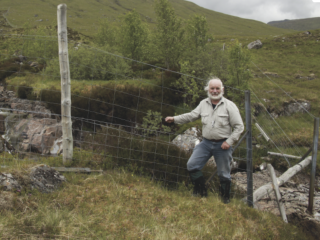Trees for Life at the SER World Conference
 Our Founder, Alan Watson Featherstone, will be speaking at the 6th Society for Ecological Restoration World Conference in Manchester.
Our Founder, Alan Watson Featherstone, will be speaking at the 6th Society for Ecological Restoration World Conference in Manchester.
Between the 23rd and 27th August, the conference will bring together more than 1,000 delegates from around the world to explore the role of ecological restoration as a means of responding to current and future causes of environmental degradation.
Founded in 1988, the Society for Ecological Restoration (SER) is an international non-governmental organization dedicated to promoting ecological restoration as a means of sustaining the diversity of life on Earth and re-establishing an ecologically healthy relationship between nature and culture. The Society believes that active, science-based restoration of damaged and degraded ecosystems, in combination with conservation and effective management of key natural areas, is vital to maintaining biological diversity and ecosystem goods and services. 
SER 2015 aims to be the major restoration event of the year and to attract a mix of both academics and practitioners from the public, private and nonprofit sectors. This year the theme is: Towards Resilient Ecosystems: Restoring the Urban, the Rural and the Wild.
With Trees for Life actively promoting the restoration and rewilding of the Scottish Highlands, it is clear why Alan has been asked to speak on this subject. As the final plenary speaker of the event, he will present a talk entitled 'Restoring the Caledonian Forest in Scotland', an abstract to which is below:
"At its maximum extent, the Caledonian Forest covered a large part of the Highlands of Scotland, but by the 20th century it had been reduced to scattered remnants consisting solely of old trees nearing the end of their lives, and covering a tiny fraction of the forest’s former range. Overgrazing by deer and sheep had prevented the growth of any new trees for about 200 years, leaving the ecosystem as fragments of ‘geriatric woodland’, missing many of its species and with key ecological processes no longer functional.
Overgrazing by deer and sheep had prevented the growth of any new trees for about 200 years, leaving the ecosystem as fragments of ‘geriatric woodland’
This presentation will focus on work that has taken place in the past 3 decades to address this problem, and to assist the ecological recovery of the forest and its associated species. Drawing on examples from the work of Trees for Life and other projects, it will elucidate three key elements involved in the rewilding of the Caledonian Forest and 12 principles used to guide the ecological restoration process. Accompanied by high quality photographs, the presentation will feature dramatic ‘before and after’ images that demonstrate the results that have been achieved, and which illustrate the positive trophic cascades that develop spontaneously as the forest ecosystem recovers.
It will also highlight the importance and necessity of other steps in the restoration process that have yet to be implemented, including the reinstatement of apex predators such as the Eurasian lynx and the wolf, and the re-establishment of critical ecological processes such as disturbance and natural succession.
The presentation will include a discussion of the key role that volunteers can play in the work of ecological restoration, and the wider societal benefits that can bring, which in Scotland includes contributing to the momentum for greater political self-determination. It will conclude with a brief summary of the relevance of the work for the restoration of degraded forest ecosystems elsewhere in the world."
To find out more about SER and the conference, visit their website: ser2015.org

